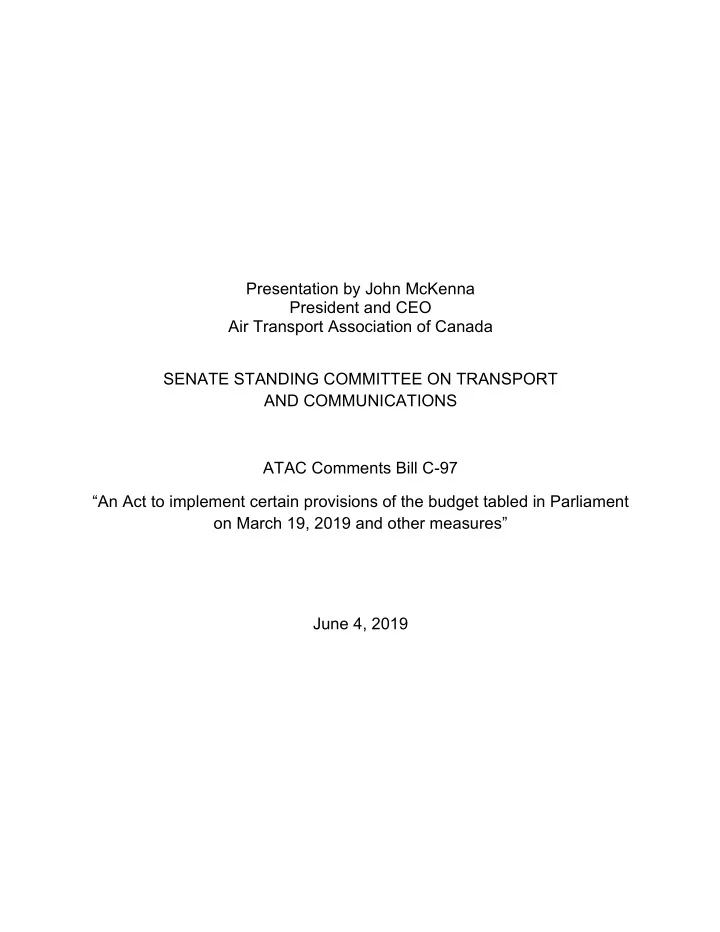

Presentation by John McKenna President and CEO Air Transport Association of Canada SENATE STANDING COMMITTEE ON TRANSPORT AND COMMUNICATIONS ATAC Comments Bill C-97 “An Act to implement certain provisions of the budget tabled in Parliament on March 19, 2019 and other measures” June 4, 2019
1 Good morning, My name is John McKenna and I am the President of the Air Transport Association of Canada. ATAC is celebrating this year its 85 th Anniversary representing Canada’s commercial air transport industry. We have approximately 180 members engaged in all levels of commercial aviation operating in every region of the country. We thank you for this opportunity to offer comments on Bill C-97, more specifically on the privatization of passenger screening in Canada. Let me state from the onset that we support the transformation of CATSA or the creation of a new Designated Screening Authority (DSA) on the condition that it be granted the necessary tools to maximize efficiencies in the short term and be able to keep pace with the growth of our industry. We caution, however, against high expectations of great efficiency gains at the operational level, as the benefits of privatization will be greater autonomy for the DSA in its long-term planning, staffing and financing. ATAC supports the amendments proposed by the National Airlines Council of Canada with regards to compensation for the cost impact of ministerial directives related to security and the abolition of the Air Travelers Security Charge (ATSC). The Government is anxious to apply the solution which led to the successful privatization of Air Navigation Services (ANS) and the creation of NAV CANADA. A very short deadline, however, has been set, which some would even qualify as unrealistic if the commercialization of airport security screening is to produce a net advantage in terms of cost and efficiency which would improve the passenger experience. A price tag of over $500 million is being shamefully attached to this privatization in an effort by the Government to cash in on the CATSA book value. This is totally unacceptable as the traveling public has already paid for any capital assets of the existing screening authority. In fact, passengers have already paid for them twice because the ATSC has
2 generated well over $500 million in surpluses over the CATSA budget allocations in the past 5 years alone. Transport Canada is not clear on the price tag issue. One day we are told that the book value price is non-negotiable, and the next day we are told that everything is on the table. Allow me to remind you that every year the Government of Canada imposes on our industry a Fuel Excise Tax – collecting over $100 million, Airport Rent - $350 million, the ATSC - over $700 million, and now the Carbon Tax. The Government collects well over $1 billion each year, not even including consumer, corporate and income taxes, but doesn’t reinvest any of it back in aviation. Airport infrastructure is entirely paid for by the passenger, as is aviation security. Airlines assume all costs of ANS in Canada. Not only is no other mode of transport left to completely finance its infrastructure and operations, the Canadian air transport industry has been made into an important revenue stream for the Government, seriously impacting our competitiveness, domestically against other modes of transport, and internationally against foreign operators. We believe that anything other than a nominal price of $1 for CATSA’s assets is unacceptable and could very well compromise the process. A clear precedent was set when the Government divested itself of hundreds of airports across Canada in a previous Liberal Government. Another concern is that to pay for this outrageous price tag, the new DSA will have to include the debt payment when setting the new passenger screening charge. Need I remind the members of this committee that Canada already has one of the highest aviation security charges in the world. Finally, when asked, the Government did not deny that it would probably seek compensation for the loss of the hundreds of millions generated by the ATSC surpluses. This is probably why the Bill doesn’t abolish the current ATSC. If not through the current charge, added to the new DSA dedicated fees, how would the loss of this revenue for the Government be
3 compensated if not by additional fees and charges to our passengers and carriers? Containing the cost to the public is critical to maintaining Canada’s competitiveness and to address the leakage to the US market. It is the Government’s responsibility to ensure that its policies support rather than hinder the competitiveness of the air travel services to Canadians. Further milking the air transport industry and its passengers is unacceptable and detrimental to our industry. Once set, the new DSA will be in place for the next 10-20 years. Canadians deserve that this process not be governed by an electoral agenda, that travelers not incur an increase in costs, and that all concerned take the time required to develop a strong, efficient, autonomous, transparent and well governed model. We are not in the least satisfied at this point that this is the case. Thank you.
Recommend
More recommend